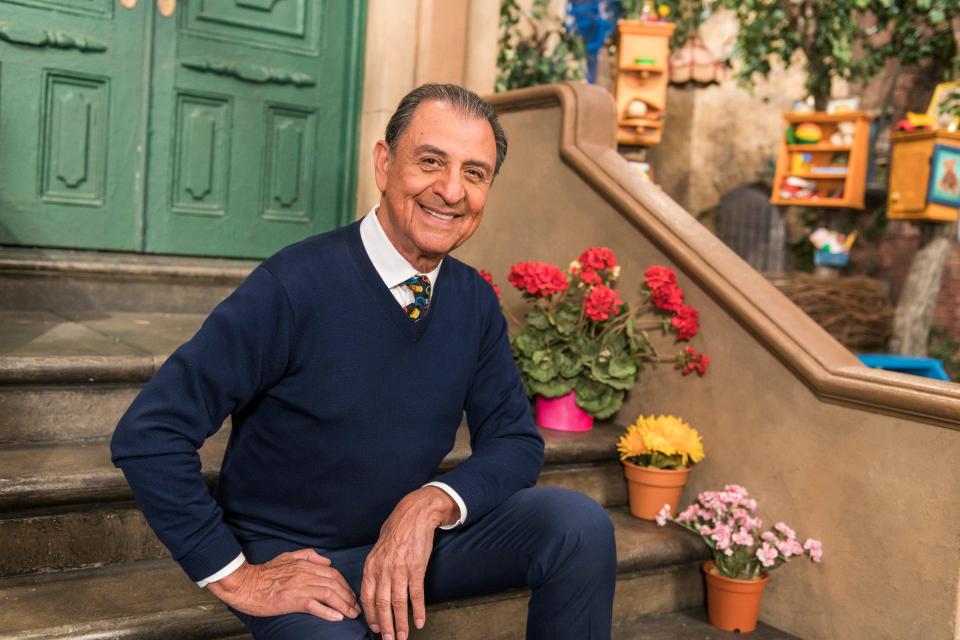BookLovers pays tribute to a favorite 'Sesame Street' character: Gracias por todo, Luis
- Oops!Something went wrong.Please try again later.
- Oops!Something went wrong.Please try again later.
Like so many, I grew up on Sesame Street.
Grover, Big Bird, Snuffleupagus, Oscar the Grouch, Bert and Ernie and crew — and their human neighbors Gordon, Susan, Bob, Maria, and Luis — were friends who taught us the alphabet, to form words, to count, add, spell, speak basic Spanish.
The characters were so real, that I couldn’t picture Kermit as being voiced by Jim Henson. I was devastated the day I learned there was a human inside Big Bird. And up until recently, I still thought Luis’s name was Luis.
Emilio Delgado — or as generations know him, Luis the Fix-It Shop owner from “Sesame Street” — died last week at age 81. He’d been diagnosed with multiple myeloma, a form of blood cancer, two years ago.

And in a column about words and literacy, I can’t not pay tribute to him.
Father-figure, friend, and teacher to viewers since his first appearance on “Sesame Street” more than half a century ago in 1971, the first generation of kids he taught are now pushing 60.
Delgado retired in 2016. The last generation of kids he taught are in elementary classrooms.
Local ties: Documentary tells how the 'Sesame Street' theme song started with a Fall River musician
Born in 1940 in Calexico, Calif., near the Mexican border, Delgado was a nervous, “young Chicano actor in from the coast” when he arrived at Sesame Street in ’71, he said.
In his debut, he taught Cookie Monster about the letter “M.” From that moment on, he was part of the neighborhood, playing guitar, teaching us songs, teaching us letters, spelling, Spanish words, and phrases.
After his death, many pointed out and praised the fact that as a Mexican-American actor, he was able to play a non-stereotypical Latino character.
“There really wasn’t any representation of actual people,” he said in a 2021 interview with the YouTube series Famous Cast Words. “Most of the roles that I went out for were either for bandits or, you know, gang members or whatever… and the women were prostitutes or maids…Those were the only parts that were around for us.”
He ended up teaching Spanish to at least three generations of Americans.
“I always threw stuff in, like, in Spanish, you know. Whatever the script was, a lot of times I’d change it, and I would ask them.. and they would be very amenable to that ” Delgado said in that interview.
Clown shop: This New Bedford business owner isn't clowning around. Well, actually, she is.
It’s because of Luis that I knew the phrase “Hola, me llamo Lauren,” as a preschooler. Could count from uno a diez in Spanish.
There were other life lessons.
When Maria and Luis got married in 1988 — with every Muppet and human gazing at them, then danced to mariachi music at the party — I was in Kindergarten: the perfect audience to be mesmerized and enchanted.
When Maria and Louis had a baby, we learned what a baby shower was, and why Maria was so tired.
When Luis broke his arm, I learned what plaster was.
When he was stuck in a room, I learned what an “Exit” sign meant.
When Luis turned into “Señor Zero” he taught us that none was also a number.
'Better late than never': Alma Del Mar teacher reacts to Sesame Street's newest neighbors
In one episode, which aired before I was born and is truly ahead of its time, Luis brings his Sesame Street pals on a trip to meet his family in New Mexico.
Big Bird speaks Spanish with Luis’s family. Gordon learns about baking bread in an outdoor oven. Oscar complains that there’s no noise, no grime, and the people are too nice.
It speaks volumes.
Searching online this week, I found a touching clip from 1995: Luis and Maria are speaking with neighbors in both English and Spanish.
Oscar the Grouch turns to the camera to complain that they’re speaking two languages. “It’s bad enough when you’re yacking and annoying me in one language. Why do you have to do it in two languages?!”
“Sometimes I say ‘oye’, sometimes I say ‘hey,’” Luis sings. “Sometimes I say ‘muy bien,’ sometimes I say ‘okay.’ In case you’re wondering how this could be, it’s ‘cause there’s both English and Spanish words in me.”
That clip embodied what Luis taught generations.
Not just about the importance of words, or how to read them — but that words live inside us. And they can live in many languages, and in many cultures, despite what the grouches of the world might say.
That’s Delgado’s legacy.
All of us live and breathe words.
Words are alive in us. Poetry exists in multitudes of languages.
Gracias, Luis. Por todo.
Lauren Daley is a freelance writer. She tweets @laurendaley1. Read more at https://www.facebook.com/daley.writer.
This article originally appeared on Standard-Times: New Bedford book columnist pays tribute to Sesame Street's Luis

